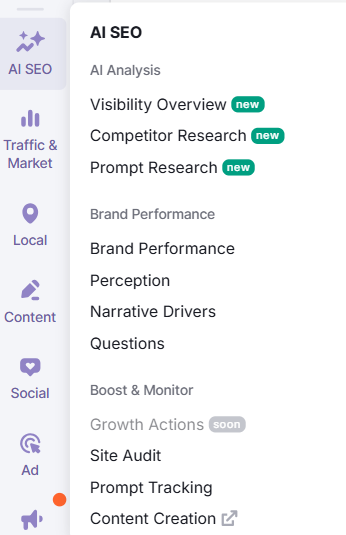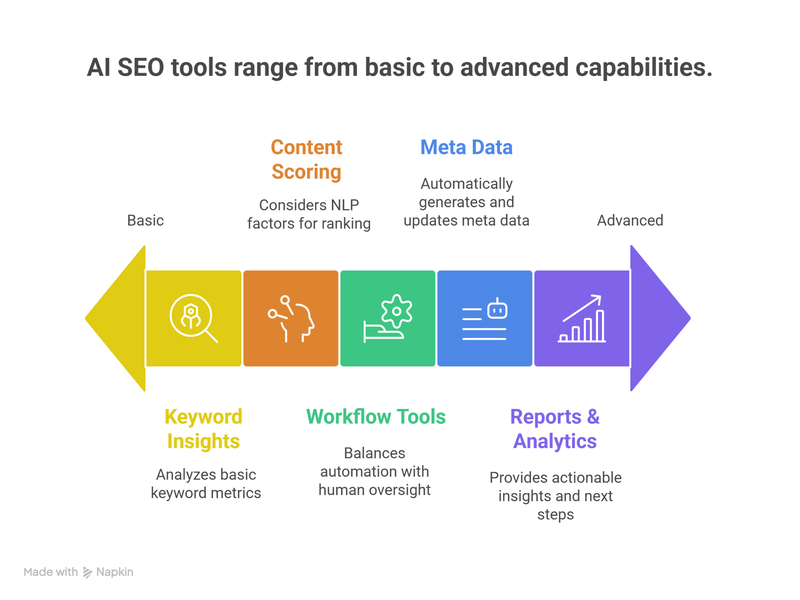AI is revolutionizing how SEO professionals approach their work, from keyword research to content creation and performance analysis. AI tools for SEO are helping marketers work smarter, identify hidden opportunities, and stay ahead in an increasingly competitive digital landscape. These innovative solutions can reduce hours of manual work to minutes, provide deeper insights into search intent, and help create content that truly resonates with both users and search engines. Whether you’re running a small business website or managing enterprise-level SEO campaigns, integrating the right AI tools into your workflow can dramatically improve efficiency and results. In this guide, we’ll explore the best AI tools for SEO, compare their standout features, and help you choose the perfect solution for your specific needs and budget.
Compare the top AI SEO tools
1. Rayo for SEO Content and Blogs

Rayo focuses on streamlining SEO content creation with its AI-powered blog generator. It analyzes top-ranking content for any keyword and creates optimized blog drafts that match search intent. Rayo’s dashboard provides content performance metrics and improvement suggestions. The platform also includes keyword clustering, SERP analysis, and content brief generation tools to support comprehensive content strategies. With its direct CMS integration, real-time performance analytics, and automated keyword research, Rayo makes the entire content creation and optimization process efficient and streamlined.
2. Jasper AI for scalable SEO content
Jasper AI excels in generating SEO-friendly content at scale. It offers templates specifically designed for meta descriptions, blog posts, and product descriptions. The Boss Mode feature allows you to create long-form content with AI assistance while maintaining control over the narrative. Jasper integrates with Surfer SEO for real-time optimization and comes with a Chrome extension to work directly on web pages.
3. Surfer SEO for real-time content scores
Surfer SEO stands out with its real-time content scoring that analyzes your content against top-ranking pages. It provides specific recommendations for word count, headings, keywords, and NLP terms. The Content Editor offers a side-by-side writing environment with real-time feedback. Surfer also includes SERP Analyzer and Keyword Research tools that leverage AI to identify content gaps and opportunities.
4. GrowthBar for easy blog creation
GrowthBar simplifies blog creation with its AI-powered content generator. Just enter a keyword, and it creates outlines and drafts based on top-performing content. Its Chrome extension provides instant SEO metrics while browsing Google results. GrowthBar offers keyword difficulty scores, backlink analysis, and competitor intelligence all in a user-friendly interface ideal for small businesses and startups.
5. INK for SEO with integrated AI assistants
INK combines a full-featured word processor with AI assistants for SEO, readability, and engagement optimization. Its AI Content Assistant can generate or rewrite content while optimizing for target keywords. INK’s real-time SEO scoring adapts to specific content types and goals. The platform also offers plagiarism checking, emotional analysis, and readability scores to create engaging, original content.
6. Frase for optimizing for search intent
Frase specializes in optimizing content for search intent through AI-powered topic research. It analyzes top-ranking content to identify questions, topics, and keywords that match user intent. The Content Brief generator automatically creates comprehensive content guidelines. Frase’s AI writer can draft sections based on these briefs, and its optimization tools ensure content aligns perfectly with what users are searching for.
7. SEMrush with AI writing and keyword intel

SEMrush has integrated AI capabilities across its comprehensive SEO platform. The SEO Writing Assistant provides real-time content optimization suggestions based on top-performing content. Its AI-enhanced keyword research tools identify semantic relationships and content opportunities. SEMrush also offers automated site auditing, position tracking, and competitive analysis powered by machine learning algorithms.
8. Ahrefs with predictive AI features
Ahrefs has incorporated AI to enhance its already powerful SEO platform. Its predictive ranking features help forecast potential traffic gains from content improvements. The Content Gap tool uses machine learning to identify high-value keyword opportunities your competitors rank for. Ahrefs’ AI also powers its keyword research suggestions, difficulty scores, and traffic potential estimates to guide strategic decisions.
9. Scalenut for NLP-powered clusters
Scalenut leverages Natural Language Processing (NLP) to create topic clusters that cover subjects comprehensively. Its Cruise Mode can generate complete, SEO-optimized blog posts in minutes. The platform’s AI analyzes top-ranking content to create detailed briefs with NLP terms, questions to answer, and headings to include. Scalenut also offers plagiarism checking and a Chrome extension for quick content analysis.
10. RankIQ for high-traffic low competition terms
RankIQ specializes in finding high-traffic, low-competition keywords within specific niches. Its AI-powered keyword library is hand-picked for various industries. The Content Optimization tool provides specific recommendations to outrank competitors, including exact keyword usage, content structure, and topic coverage. RankIQ’s simplicity makes it ideal for bloggers and small businesses focused on content-driven growth.
11. Alli AI for full-stack SEO automation
Alli AI offers end-to-end SEO automation from technical audits to content optimization. Its AI engine continuously monitors your site and prioritizes actionable recommendations. Alli can automatically generate meta descriptions, title tags, and schema markup. The platform also includes automated reporting, competitor tracking, and AI-driven insights that explain the “why” behind every recommendation.
Benchmark AI features that matter

Keyword insights with AI precision
Modern AI SEO tools go beyond basic keyword metrics by analyzing semantic relationships, search intent, and content relevance. Look for tools that identify question-based queries, related topics, and contextual keyword usage patterns. The best AI keyword tools can predict content performance, suggest topic clusters, and provide competitive difficulty scores based on your site’s specific authority. This deeper analysis helps you target terms that drive qualified traffic, not just high volume.
Content scoring, SERP match and NLP depth
AI content scoring has evolved to consider Natural Language Processing (NLP) factors that influence rankings. Effective tools analyze entities, topics, and semantic relationships that top-ranking content covers. Look for features that provide specific recommendations on content depth, structure, and knowledge gaps. The most sophisticated tools can differentiate between informational, commercial, and navigational content needs, helping you match search intent precisely.
AI workflow tools vs native human control
The best AI SEO tools strike a balance between automation and human oversight. Look for platforms with adjustable AI involvement that let you control how much the AI influences the final output. Effective workflow tools streamline repetitive tasks while preserving your unique voice and strategic decisions. Consider how well the AI integrates with your existing processes, whether it can adapt to your brand voice, and how it handles industry-specific terminology.
Automation extent for tasks like meta data
AI automation capabilities vary significantly between tools. Some platforms can automatically generate and update meta titles, descriptions, alt text, and schema markup based on page content. Advanced tools can identify technical SEO issues, prioritize them by impact, and even implement fixes automatically. When evaluating automation features, consider both breadth (how many different tasks can be automated) and depth (how completely each task can be handled without human intervention).
Reports, analytics, and next move prompts
AI-enhanced analytics go beyond data visualization to provide actionable insights. Look for tools that not only track performance but explain causation and recommend specific next steps. The best platforms use predictive analytics to identify emerging opportunities and potential issues before they affect rankings. Consider whether the reporting features can be customized for different stakeholders, from technical SEO specialists to executives needing high-level insights.
Choose the right tool based on fit
Best pick for keyword research
For pure keyword research power, Ahrefs and SEMrush lead with their AI-enhanced keyword discovery capabilities. Ahrefs excels in identifying keyword gaps and estimating traffic potential, while SEMrush offers stronger competitor keyword intelligence. For niche sites, RankIQ provides curated, low-competition keyword libraries that can fast-track content success. GrowthBar offers an excellent middle ground with its Chrome extension that provides instant keyword insights directly in Google search results, making it perfect for quick research sessions.
Top tool for content generation and optimization
Rayo stands out in content generation, offering features like real-time performance analytics, automated keyword research, and seamless CMS integration. Starting at just $3 per blog, it ensures high-quality, SEO-optimized content, making it ideal for scaling content creation while maintaining quality. Surfer SEO for content optimization with its real-time scoring system adapts to your specific keyword and content type. Frase excels at search intent optimization, helping ensure your content answers the questions users are actually asking. For teams creating large volumes of content, Jasper paired with Surfer creates a powerful combination for scale and quality. INK offers the most comprehensive readability and engagement optimization alongside SEO features, making it ideal for brands prioritizing user experience alongside rankings.
Tools that support complete SEO automation
Alli AI offers the most comprehensive automation across technical, on-page, and content SEO tasks. SEMrush provides extensive automation capabilities within its all-in-one platform, including site audits, rank tracking, and content optimization. For content-focused automation, Scalenut’s Cruise Mode can handle the entire process from research to publishing. Consider how much control you need to retain full automation saves time but may require more quality checks and strategic oversight.
Budget friendly choices under $100
GrowthBar offers exceptional value for small businesses at around $29/month with its combination of keyword research, content generation, and Chrome extension. RankIQ provides specialized niche keyword libraries and optimization tools starting at $49/month, ideal for bloggers and content creators. Frase’s basic plan offers powerful content optimization features under $50/month. For those just starting, free tools like Google’s NLP API combined with structured data testing tools can provide core AI SEO functionality without any investment.
Tech-savvy vs beginner friendly tools
For beginners, GrowthBar and RankIQ offer the most straightforward interfaces with minimal technical knowledge required. Jasper provides an intuitive platform for content creation with templates that guide users through the process. Tech-savvy users will appreciate Surfer SEO’s detailed NLP analysis and customization options. SEMrush and Ahrefs deliver comprehensive data sets that reward technical users who can interpret advanced metrics. Consider your team’s expertise when choosing the most powerful tool is the one your team will actually use consistently.
Conclusion: Pick smarter to grow faster with AI
The right AI tools for SEO can dramatically accelerate your growth by automating routine tasks, uncovering hidden opportunities, and helping create more effective content. Rather than trying to use every tool available, focus on finding solutions that address your specific challenges and integrate well with your existing workflow. As AI continues to evolve, the most successful SEO professionals won’t be those who rely entirely on automation, but those who learn to collaborate effectively with AI to enhance their human expertise. By selectively adopting the tools that best fit your needs, you’ll be positioned to achieve sustainable growth while staying ahead of competitors still using manual methods.
FAQs
Which AI tools for SEO are best for beginners?
Beginners should look for tools with intuitive interfaces and guided workflows. GrowthBar is excellent for novices with its straightforward keyword research and content generation features. RankIQ offers a simplified approach focusing on high-opportunity keywords with clear optimization instructions. Jasper provides templates that guide you through creating different types of SEO content. Look for tools that offer educational resources, onboarding support, and visual feedback on your optimization efforts. The best beginner tools explain not just what to do but why it matters, helping you build SEO knowledge while improving your site.
How is AI used in advanced keyword research?
Advanced AI keyword research goes beyond basic metrics like volume and difficulty. Modern AI tools analyze semantic relationships between keywords to identify topic clusters and content gaps. They can predict which keywords will drive not just traffic but conversions based on intent analysis. AI can also identify trending topics before they show up in traditional keyword tools by analyzing search patterns and content engagement. The most sophisticated tools can recommend keyword targeting based on your site’s specific authority profile and competitive landscape, focusing your efforts where you have the highest probability of ranking success.
What AI content optimization features should I look for?
Look for content optimization tools that provide specific, actionable recommendations rather than generic advice. The best tools analyze top-ranking content to identify patterns in structure, topic coverage, and language use. Features like real-time scoring, competitor content comparison, and NLP entity analysis help create comprehensive content. Advanced tools can distinguish between different content formats (listicles vs how-to guides vs reviews) and provide format-specific optimization advice. Also valuable are tools that can identify content gaps, suggest questions to answer, and recommend internal linking opportunities based on your existing content.
Should I rely only on AI for content and SEO decision-making?
While AI tools offer powerful capabilities, they should complement rather than replace human judgment. AI excels at analyzing data patterns and automating repetitive tasks but lacks contextual understanding of brand voice, audience nuances, and business goals. The most effective approach combines AI efficiency with human creativity and strategic oversight. Use AI to handle data-intensive tasks, generate drafts, and identify opportunities, but maintain human review of final content and strategic decisions. As search engines increasingly reward expertise, authority, and trustworthiness, the human element of content creation remains crucial for long-term SEO success.
Are there free AI SEO tools worth using in 2025?
Yes, several valuable free AI SEO tools exist in 2025. Google’s own tools like Search Console, Google Trends, and the Natural Language API offer AI-powered insights without cost. Open-source NLP libraries can help analyze content semantics and entity relationships. Several premium tools offer free versions with limited features or query limits that are sufficient for small websites or occasional use. For content optimization, browser extensions that provide basic on-page SEO feedback often include AI components. While free tools typically lack the depth and integration

Ridam Khare is an SEO strategist with 7+ years of experience specializing in AI-driven content creation. He helps businesses scale high-quality blogs that rank, engage, and convert.



